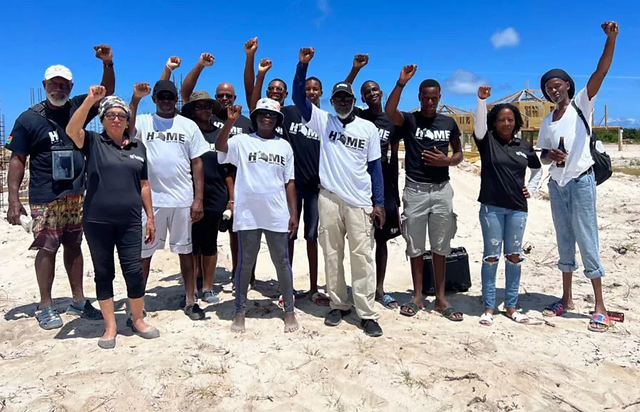Menu
Close

Land Defenders at Cedar Tree Point. Source: https://www.glanlaw.org/caribbean-landgrabs
A monumental victory for Barbuda and the entire Caribbean fighting U.S. developers in island-wide grab land post-Irma, stands as a demonstration to the indomitable spirit of grassroots initiatives for resistance, as the Privy Council sitting in London has ruled in favour of Barbudan land defenders John Mussington and Jacklyn Frank. As we celebrate this triumph, let us also reflect on the profound impact of grassroots activism in effecting positive change across our region.
Historically, Barbudans have upheld a profound sense of stewardship over their land and resources, rooted in their cultural heritage and commitment to conservation and sustainability. This ethos dates back to colonial times when Barbuda served as a crucial supplier during the plantation era, preserving their traditions, including a communal land system inherited from Africa. The passage of the Barbudan Land Act in 2007 formalised this system, bestowing significant benefits upon the community. Today, as Barbudans continue to defend their land and way of life against external threats, their resilience and dedication serve as a source of inspiration for grassroots movements throughout the Caribbean and the world.
Following Hurricane Irma in 2017, the Central Government of Antigua and Barbuda enacted policies without consultation, seeking to exploit Barbuda’s resources. This exploitation sought to develop luxury real estate on Ramsar-protected wetlands and the construction of an airport which endangers fragile ecosystems. These developments are intended to support the luxury tourism industry for the ultrawealthy, disrupting the environment, polluting the island’s water resources and displacing locals from their communally held land. The proposed developments involved extensive land clearing and the establishment of exclusive residential communities, contravening Barbuda’s legislation prohibiting land sales. Barbudans resisted these changes, identifying them as manifestations of disaster capitalism aimed at eradicating their culture and way of life. Social media emerged as a crucial tool for organising resistance and amplifying Barbudans’ voices in the face of formidable opposition. Despite adversity, Barbudans remained steadfast in safeguarding their island and heritage for future generations and have organized themselves into the Barbuda Land Rights and Resources Committee to continue the fight for their rights to a safe, clean and healthy environment and the local heritage it sustains.
The ‘Save Barbuda’ campaign has played a pivotal role in preserving the community’s identity and autonomy. Their initial strategy focused on reclaiming their homes and presence on the island, demonstrating resilience in the face of adversity. Subsequently, they raised awareness and sought legal counsel, countering government narratives that portrayed Barbuda as uninhabitable and extensively damaged post-Irma, where residents were forcibly removed while the U.S developers were allowed in. Platforms like the “Barbuda Silent No More” Facebook page provided a platform for Barbudans to assert their existence and challenge misinformation. Additionally, advocating for adherence to development control and planning laws became integral in holding the government accountable and defending Barbuda’s interests.
The determination of Save Barbuda and the full support of litigation organisations such as Global Legal Action Network (GLAN) and Garden Court Chambers have not only helped preserve Barbuda’s cultural heritage and way of life but have also served as a beacon of hope for other indigenous and land defense cases, facing similar threats of exploitation, displacement, environmental disruption, and pollution of drinking water. According to GLAN it’s not the end, since the case will return to local courts, the battle continues to stop the airport from going ahead, to restore the land and legally challenge the other developments plaguing the island, but as the Barbudans continue their fight for justice and autonomy, their case serves as an inspiration for grassroots movements worldwide.

Showcasing stories of Caribbean organizations at the foreground of the struggle against disaster capitalism in the Caribbean. Our network of participants in the Greater Caribbean region connect, learn, share their hands on responses to the impacts of the twin threats of the climate crisis and disaster capitalism in our region.
WAVE (Progressive Reform Movement)
Global Challenges Research Fund
Open Society Foundations
All Rights Reserved – strongercaribbeantogether.org 2022
All Rights Reserved – strongercaribbeantogether.org 2022
In the tumultuous aftermath of disasters, it is easy to feel isolated and alone, but you are not.
We, a network of Caribbean-wide community organizers who stand in solidarity with those affected the twin threats of the climate crises and disaster capitalism, a phenomenon that exacerbates the suffering of vulnerable communities.
We want you to know that your stories matter. We are here to listen, to support, and to amplify your voices.
We believe that together, we can challenge the forces of disaster capitalism and advocate for more sustainable, inclusive and equitable decision-making.
Join us in solidarity. Share your experiences and let’s build strong communities that thrive together.
As the wider world braces for the climate change, Caribbean communities are already struggling with its effects. Small local communities, small scale farmers and coastal communities are disproportionately affected. Political decisions, power dynamics and laws often compound the catastrophes and silence bottom up solutions.
There are ways in which you can help.